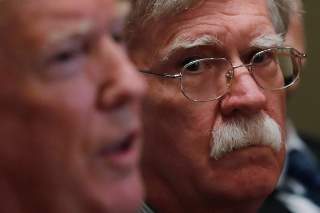Bolton Defends Putin Meeting, Planned Trump Summit
The national security advisor, a hardliner, has always been a vehement foe of talks with America’s strategic adversaries.
John Bolton, the president’s hardline national security advisor said to have fallen out of the White House inner circle after Donald Trump’s rapprochement with North Korea, was dispatched to Russia Wednesday, and took to the podium to defend a course on Moscow he had previously decried. During the presidential transition in late 2016, having just been passed on for secretary of state and national security advisor, Bolton said recent Russian sanctions didn’t go far enough. But Bolton has said repeatedly that he is not the president, and that he will, in his new role, defer to Donald Trump, who clearly favors improved relations with Moscow.
“President Trump asked me to come and speak to Russian authorities about the possibility of a meeting between him and President Putin,” Bolton told reporters. “And there will be an announcement on that tomorrow, simultaneously, in Moscow and Washington.” Some in the room commented that Bolton looked pained.
“Bolton's press conference had to be one of the weakest I've been to. He didn't tell us when and where the Trump-Putin meeting will be, gave one-sentence answers besides for the final planted question & finally openly said ‘I'll just duck that question,’” tweeted Telegraph correspondent Alec Luhn. A Kremlin official told the Wall Street Journal that the meeting will occur, in a third country, and will focus on ties between Washington and Moscow, arms control and Syria. Speculation had been mounting that the meeting would occur in Russia proper, with the possibility that Donald Trump would attend the World Cup final with Putin, concurrent with his planned trip to London in July to meet Theresa May.
Others, including former administration officials, told me that the Russia meetings are a bad idea in light of the ongoing Robert Mueller probe on Russia’s interference campaign in the 2016 election.
Bolton said Wednesday: “We did indeed talk about Russian interference in the elections and I expect it will be a subject of conversation between the two presidents as well.”
And at the very least, he maintained a public face of supporting the administration’s tact, and provided cover for the president against some of the more pointed, partisan criticisms of his approach to Russia.
“I think a lot of people have said, or implied over time, that a meeting between President Trump and President Putin would somehow prove some nexus between the Trump campaign and the Kremlin,” Bolton said. “Which is complete nonsense.”
“Bolton’s trip to Moscow not only confirms fact of summit [is happening] but seriousness with respect to preparing agenda,” Matthew Rojansky, director of the Kennan Institute at the Wilson Center told me. “A summit can help revive essential working level contacts between the two sides which have been all but frozen.”
But Rojansky urged focus.
“Bolton is right we have many disagreements and we shouldn’t expect them to be easily resolved. … Urgent issues are strategic stability in nuclear realm and containing and de-escalating risks of direct conflict, especially in the Baltic region and around Syria. The goal should be to empower working level follow up on these and other issues,” he said.
At the very least, Bolton’s trek confirms information relayed by Victor Cha, Trump’s scuttled Korean ambassador, at the W hotel in Washington earlier this year. Secretary of State Pompeo has been given the North Korea portfolio, while Bolton has been given the Russia and Syria portfolios, which the administration sees as increasingly linked-- a deal must be hatched to deal with Moscow’s client, Bashar al-Assad.
It is unusual that the State Department and Bolton’s National Security Council, occasionally at odds, have a partition arrangement, but it is the management style the president prefers. A former senior administration official told me that Trump would ideally have no chief of staff, with a rotating cadre of perhaps ten advisors with various roles; the president isn’t a stickler for credentialism-- tellingly, the head of the Pentagon, James Mattis, wasn’t present at the North Korean negotiations, even as the president, without telling Mattis, not only floated but criticized American military drills around the Korean peninsula.
True to form, the State Department referred me to the NSC and the White House for this story.
A White House official declined to elaborate.
Curt Mills is a foreign-affairs reporter at the National Interest. Follow him on Twitter: @CurtMills.

